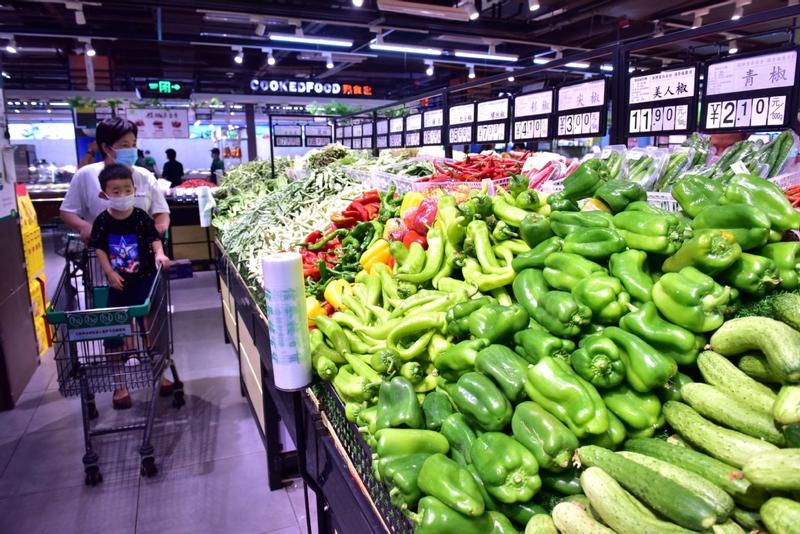 Customers look over vegetables at a supermarket in Shijiazhuang, capital of Hebei province, on June 10. (JIA MINJIE / CHINA DAILY)
Customers look over vegetables at a supermarket in Shijiazhuang, capital of Hebei province, on June 10. (JIA MINJIE / CHINA DAILY)
There has been an improvement in consumers' willingness to step up consumption of products, services and technologies in China as the country has subdued the novel coronavirus by and large.
Despite the crisis, China's economy and consumer market are extremely resilient
This is expected to bring new vitality to domestic economic development, a research report from Nielsen showed.
The global measurement and data analytics company said in its report: "Since the outbreak of the virus, China's experience in fighting off the disease has been a barometer for the world. As people's life gradually returns to normal, consumer-driven domestic demand is now recovering in China, which has injected optimism into the wider global market," said Justin Sargent, president of Nielsen China.
Despite the crisis, China's economy and consumer market are extremely resilient. Taking the 2008 Global Financial Crisis as an example, China's economy and the fast-moving consumer goods industry rebounded rapidly after dropping during that period.
ALSO READ: FMCG outlets witness considerable momentum in 2019
"China's consumer market has begun to show signs of recovery. Driven by a number of government policies aimed at spurring consumption, the retail industry continues to improve and new consumption momentum has emerged," said Sargent.
According to data released by the National Bureau of Statistics, the total retail sales of consumer goods dropped 2.8 percent year-on-year in May, compared to the decrease rate of 7.5 percent of April. The slowed-down decreasing rate indicated that the consumption has been gradually picking up.
Kateryna Edelshtein, vice-president of Nielsen China, said:"While we saw the decline of the overall retail business, a few industries have finally returned to growth and are stabilizing. FMCG posted positive growth of 8 percent in April, mainly driven by online momentum."
Businesses like online shopping, online education, remote office, health and technology grew during the pandemic and are still developing. Online consumption remains popular.
Nielsen research showed FMCG online sales climbed 33 percent year-on-year in January and February, 32 percent in March and 43 percent in April. So far this year, the number increased 37 percent year-on-year, maintaining a growing momentum.
Nielsen's latest CEO survey also shows that business leaders' confidence increased in May. Asked about the pandemic's impact on companies, 75 percent of the respondents believed that the situation in the second quarter was optimistic or not affected.
The proportion was much higher than 40 percent in March. Fifty-five percent of those surveyed believed that the disease will either not affect or have a positive impact on the company's overall performance in 2020. In March, the proportion was 50 percent.
READ MORE: Robust demand for imported goods buoys overseas FMCG companies
According to Nielsen's long-term market monitoring, a large number of new products appear in China's FMCG market each year, accounting for 46 percent of FMCG growth. The market growth brought about by successful product innovation cannot be under-estimated.
Given the novel coronavirus, brand-owners had a slow start in innovation in the first quarter. But there was a strong revival in the March-April period, with the number of new launches climbing 6 percent year-on-year.
Local brands have delivered rapid growth in recent years, which means that localization is becoming a new trend in product innovation.
Nielsen data shows that 17,251 new items were launched in March and April this year, and seven in 10 new products belong to small regional players. These small regional players have become an important force driving product innovation.
Zheng Hao contributed to this story.


